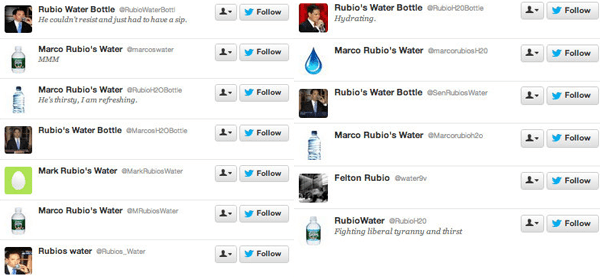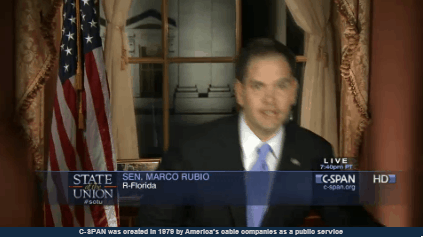It was the sip heard around the world… last week, during the GOP response to President Obama’s State of the Union Address, Florida Senator Marco Rubio caused a social media sensation by awkwardly lunging for a water bottle in the middle of his speech. Within seconds, Twitter exploded with mocking commentary, and the incident was quickly turned into humorous memes and gifs like the one above. Know Your Meme has a good roundup of the viral media explosion surrounding Rubio’s water break, which includes documentation of over a dozen Twitter parody accounts impersonating the water bottle itself.

See more on Know Your Meme
This social media activity brings to mind Jason Wilson’s 2011 study of political Twitter-faking published in the journal Convergence, entitled “Playing With Politics.” Interestingly, Wilson’s contention is that the people who create these political parody accounts on Twitter have no interest in making a political impact, and see themselves as simply entertaining a niche audience of political junkies (or ‘political fans’). While this suggests that the Rubio incident could be simply a matter of political discourse being transformed into popular culture, such an account seems to miss some of the underlying issues at play.
While there is no evidence as of yet regarding why people shared memes, gifs, and viral videos mocking Rubio’s water sip, the phenomenon does seem to have a real political dynamic behind it. It would be no surprise to learn that those who jumped on the incident via social media were largely Rubio critics who had a vested interest in adding to his humiliation, with the hopes that damaging his public reputation could potentially cause trouble for his future political career as a Republican presidential hopeful.
In fact, I would argue that rather than being pure pop culture fun, this sort of coordinated social media ridicule is becoming a key instrument of political power in our contemporary era of post-modern ‘mediatized’ politics. As John Corner and Dick Pels explain in their landmark 2003 volume “Media and the Restyling of Politics,” the dominant position of television and new media in political discourse have thoroughly tipped the balance in favor of style over substance, for better or for worse. Political style (performed through live television appearances, among other things) has become a primary way in which citizens evaluate their leaders. By pointing to Rubio’s “not ready for primetime” moment, the water bottle mockers were effectively making a rhetorical argument about the politician’s shortcomings as a master of political style. Of course, such a critique fails to engage with the actual substance of Rubio’s speech. Those who are concerned about the trivialization of politics via popular media (such as followers of Neil Postman, Stuart Ewen, and the like) may view this as a worrisome sign of the times.
Furthermore, Rubio quickly sensed how the embarrassing incident was being used against him by political detractors on social media (not to mention the obligatory parodies on The Daily Show, The Colbert Report, and Saturday Night Live) and responded with a style-conscious and social media-savvy strategy of his own. Almost immediately after the speech, Rubio tweeted a photo of the water bottle as an exercise in ingratiating self-effacement.

A few days later, Rubio’s Political Action Committee launched a line of Rubio-branded water bottles, which supporters could receive with a $25 donation. The effort has already raised over $100,000 for the PAC, leading media outlets to declare that Rubio is having the last laugh. These developments suggest that both political camps are becoming highly sophisticated in their attempts to ‘spin’ viral moments on social media, and that style-heavy political rhetoric is increasingly being countered not with political substance but simply with more clever style. Which side is doing the better job here is likely in the eye of the beholder…
